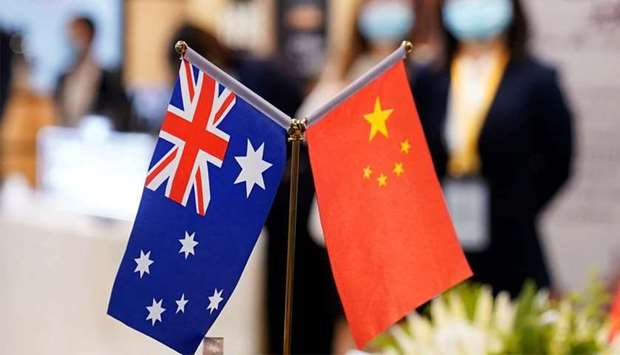China yesterday “indefinitely” suspended all activity under a China-Australia Strategic Economic Dialogue, its state economic planner said, the latest setback for strained relations between the two countries.
“Recently, some Australian Commonwealth government officials launched a series of measures to disrupt the normal exchanges and co-operation between China and Australia out of Cold War mindset and ideological discrimination,” China’s National Development and Reform Commission (NDRC) said in a short statement on the decision.
The commission did not say in the statement what specific measures prompted the action.
China’s foreign ministry spokesman, Wang Wenbin, told a daily conference the suspension was a “necessary and legitimate” response to Australia “abusing” the concept of national security to pressure co-operation with China. “Australia must bear full responsibility,” he said.
The Australian dollar fell sharply on the news and was as low as 0.7701 to the US dollar from Wednesday’s $0.7747.
Bilateral ties were strained in 2018 when Australia became the first country to publicly ban Chinese tech giant Huawei from its 5G network.
Relations worsened last year when Australia called for an independent investigation into the origins of the novel coronavirus, prompting trade reprisals from China. Australian Trade Minister Dan Tehan said the commission’s decision was disappointing because the economic dialogue was “an important forum for Australia and China to work through issues relevant to our economic partnership. “We remain open to holding the dialogue and engaging at the ministerial level,” he said in a statement. The last meeting was in Beijing in 2017, when Australia’s trade minister signed an agreement on co-operation on Belt and Road projects in third-party countries.
Australia has, however, declined to sign agreements on direct participation in China’s flagship foreign policy initiative.
In April, Canberra cancelled two Belt and Road co-operation deals struck by the state of Victoria, prompting the Chinese embassy to warn that ties were bound to worsen.
Australia’s federal parliament granted veto power over foreign deals by states in December amid the deepening diplomatic dispute with China, which has imposed a series of trade sanctions on Australian exports.
Successive Australian trade ministers have been unable to secure a phone call with Chinese counterparts since diplomatic tensions worsened in 2020.
In the 12 months to March, Australia exported A$149bn ($115bn) worth of goods to China, excluding services, of which iron ore was by far the largest product.

(File photo) Australian and Chinese flags. (Reuters)
